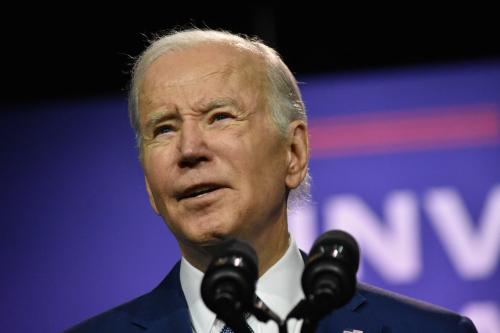So far, the hard data on Latino voting behavior and policy preferences strongly suggests it is likely that President Biden will garner a similar share of Latino voters as Democratic candidates in 2022, thus helping the President win another term in office.
There are three main reasons why, all driven by rigorous survey data and election results.
- First, Republicans do not have a policy agenda or policy proposals that are popular with Latino voters.
- Second, as the economy continues to stabilize, Latinos’ policy priorities will be much more diverse than they were in 2020 when economic stress and fear led Trump to perform well among Latinos who identified the economy as their primary concern.
- Third, the 2022 election outcomes made clear that Latinos helped Democrats win narrow House seats across the country, bucking historic trends and a national mood that should have led to a higher vote margin for Republican candidates.
Let’s start with a brief breakdown of Latino policy preferences. As we have discussed in prior analysis, Latinos overall, and particularly Latino voters under 30, are highly supportive of the progressive policy agenda that the Biden administration will embrace in 2024. In fact, Republicans did not have any policy proposals that garnered more than 30% support among Latinos in either 2020 or 2022. On issues of tax policy, health care, abortion rights, gun safety, climate change, and immigration, a very clear majority of Latino voters support Democratic proposals.
One of the best academic analyses of Latino voting behavior in 2020 by political scientists Angela Ocampo, Angie Gutierrez, and Sergio Garcia-Rios found that Latino concern over the economy and Trump’s promise to immediately re-open the economy did, in fact, help him gain support among enough Latinos to generate the improvement from 2016 that has been widely discussed by pundits and the media. Former President Trump was able to use his business background to convince about 10% more Latinos than usual to vote Republican due to the economic uncertainty the country faced during the pandemic. As the economy continues to return to normal after the pandemic, the fear and uncertainty that led to gains for the Trump campaign among Latinos may no longer help Republicans.
Second, without the pandemic solidifying policy salience around either pandemic relief or addressing the associated economic collapse, Latinos’ policy priorities will be much more diffused in 2024. Just like in 2022 when abortion policy emerged as a key priority for Latino voters due to an unpopular SCOTUS decision, and large percentages of Latino voters identified gun violence as a top issue driving their vote, 2024 is likely to see issues beyond the economy mobilize voters. In fact, the recent SCOTUS decisions are likely to make affirmative action and protection of the rights of LGBTQ+ Americans priorities for Latino voters. Survey data from the 2022 Latino electorate found that many Latino voters were angered by the Supreme Court’s actions in 2022, with these voters being much more likely to support Democratic candidates. It is highly likely that this will happen once again in 2024, helping the Biden campaign capitalize on the enthusiasm the SCOTUS decisions will generate among Latinos.1
In order for Latinos to support Republicans to a greater extent in 2024 than in 2020, Republicans would have to present a policy agenda that resonates with the vast majority of Latinos. This is simply not happening. On the contrary, Republicans continue to lean heavily on messages that attack vulnerable groups of Americans. Indeed, many Republican-led states have moved to ban diversity, equity, and inclusion. They have banned the teaching of history that lifts up African American, American Indian, Latino, and Asian American struggles, stories, and successes. This is not an agenda popular with Latinos, and this is not George W. Bush’s Republican Party, which spent years attempting to improve its image with minorities and immigrants. Republicans have still not matched their high point of 40% of the Latino vote won by George W. Bush in 2004, and heading into 2024, more data suggests Biden will improve on his 2020 numbers and reverse a short-term, pandemic-related slide in 2020.
The third point in our argument is perhaps the most important. The same predictions of Latino voters moving to the right to help propel a red wave ahead of the 2022 election proved to be dead wrong. History has shown that the incumbent’s party should lose support in their first midterm, with many predictions suggesting a double-digit slip among Latinos from 2020 to 2022. But that did not happen. Yes, there was a modest shift toward the GOP from 2020, but Latinos turned out to vote in high numbers and continued to vote 2-to-1 for Democrats in 2022. In fact, recent research finds that the improvement the GOP had with Latino voters relative to the 2018 election when Democrats garnered a nearly 50% advantage with Latinos was not due to shifts in voting behavior but higher voter turnout among Latino Republicans.
Across several specific races in 2022, Latino voters were key to Democratic victories, often in districts and states poised for Republicans to win. For example, pundits said Senator Cortez Masto could lose the Latino vote and lose reelection. She did not, and it was the Latino vote in Clark and Washoe counties that provided the critical margin of victory. Likewise, Democrats held three toss-up House seats across Nevada thanks to strong turnout and support from Latinos. In Arizona, Latinos turned out in large numbers giving Democrats three consecutive statewide wins in what had been a safe Republican state. In South Texas, Latino Democrat Vicente Gonzalez easily defeated Latina Republican Mayra Flores to flip the seat back to the Democrats, and Latino Democrat Henry Cuellar posted a double-digit win in a second South Texas seat that was projected to be a tight race.
In Colorado’s new 8th district, Latina Democrat Yadira Caraveo won on the strength of the Latino vote. It was the same story in New Mexico’s 2nd district where Latino Democrat Gabe Vasquez flipped a Republican seat with an upset against a Trump-endorsed Republican incumbent based on strong Latino support. In Orlando, Democrats elected Afro-Latino Maxwell Frost and now have two Latino House members in Central Florida.
Much can happen between now and the general election. However, today feels a lot like the run-up to the 2022 election when many pundits were predicting a shift to the GOP among Latino voters that would help propel a big year for Republicans. Those predictions never materialized then, and thus far the data suggests the same predictions about 2024 will not materialize next November.
-
Footnotes
- The survey data referenced herein was produced independently by a third-party firm, BSP Research on behalf of the African American Research Collaborative. Outside of his work at Brookings, Dr. Gabriel Sanchez serves as Director of Research for BSP Research and was part of the group of scholars who designed and implemented this survey.
The Brookings Institution is committed to quality, independence, and impact.
We are supported by a diverse array of funders. In line with our values and policies, each Brookings publication represents the sole views of its author(s).








Commentary
Will Latino voters help lead the GOP to victory in 2024?
July 18, 2023